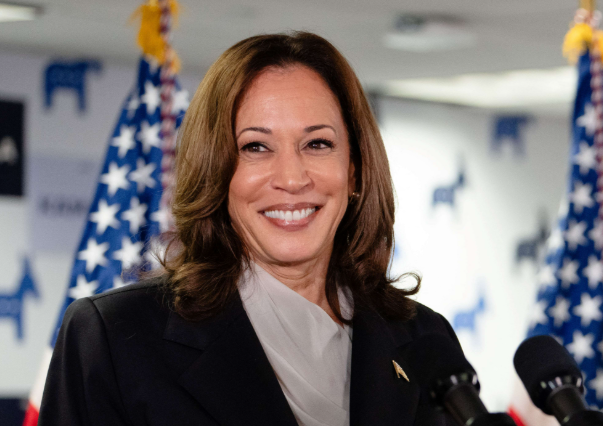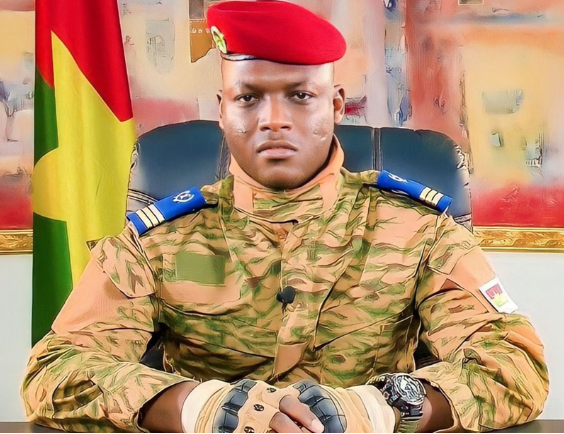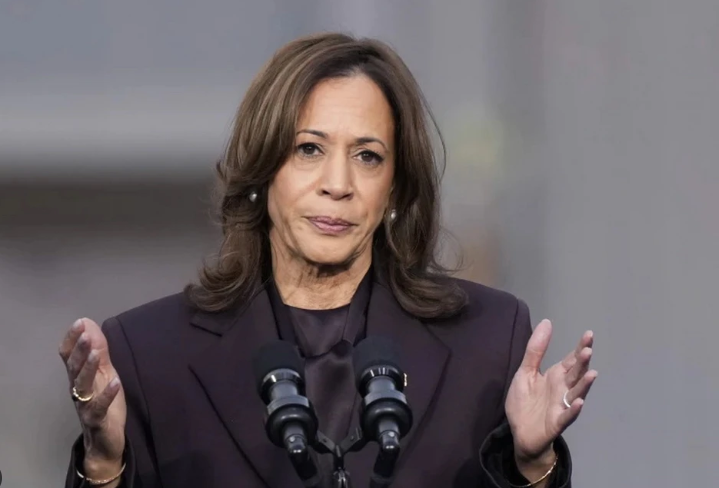**”A New Dawn in Diplomacy: Ibrahim Traoré’s Stunning Retort to Kamala Harris Shakes the World Stage”**

In an unprecedented display of eloquence and authority, Ibrahim Traoré, the 35-year-old President of Burkina Faso, turned the tables on U.S. Vice President Kamala Harris, delivering a powerful response that has reverberated across the globe and ignited a renewed conversation about African leadership and dignity. What began as a political skirmish quickly escalated into a defining moment for international relations, as Traoré’s articulate rebuttal became a rallying cry for a new generation of African leaders.
The drama unfolded on a sweltering May morning in Wagadugu, as Traoré’s aide delivered the shocking news: Harris had branded him a “young dictator” and questioned his intellectual capacity, a personal attack that struck at the heart of his efforts to uplift a nation grappling with significant challenges. The words were not just a critique of his governance; they struck at the very essence of his identity as a leader committed to transformative change in Burkina Faso.

Determined to reclaim his narrative, Traoré convened an emergency cabinet meeting, meticulously preparing for a press conference that would not only address Harris’s remarks but also showcase his administration’s achievements. The world tuned in on May 15, with international journalists buzzing in anticipation. Traoré entered the room with the poise of a seasoned statesman, ready to confront the Western narrative head-on.
“Madame Vice President, you said I am a young dictator,” he began, gesturing to a screen that illuminated his administration’s accomplishments: a significant reduction in poverty, an impressive GDP growth rate, and the establishment of hundreds of new schools. He emphasized the legitimacy of his governance, highlighting that Burkina Faso had conducted three free elections with an 89% voter turnout—an extraordinary feat in a continent still struggling with democratic practices.

The moment was electric. Traoré’s confidence and command of facts transformed the atmosphere, creating a palpable shift in perception. “You called me a regional threat,” he continued, addressing Harris directly. “Terrorist attacks have decreased by 65% since 2022. Burkina Faso is now the safest country in the Sahel.” His assertion was met with a wave of approval from the audience, as he not only defended his leadership but also articulated a vision for a continent rising in strength and self-determination.
By the time he concluded his remarks, social media was ablaze with reactions. The hashtag #TraoréTruth trended globally, with an overwhelming majority of responses praising his dignity and clarity. In Washington, Harris’s team scrambled to assess the fallout, recognizing that the vice president had underestimated the impact of her words. Polls showed a significant drop in American approval across Africa, and calls for a diplomatic reset grew louder.

In the wake of Traoré’s powerful address, the international community took notice. Leaders from across Africa rallied in support of the young president, while invitations poured in from prestigious universities in the U.S., eager to hear from the man who had turned a diplomatic incident into a masterclass on leadership.
As the dust settled, the implications of Traoré’s response became clear. His press conference had not just defended his leadership; it had sparked a pan-African movement for self-respect and partnership. Countries across the continent began to reassess their relationships with Western powers, demanding mutual respect rather than paternalistic aid.
The following weeks saw a remarkable shift. Kamala Harris, facing intense pressure, took the bold step of traveling to Burkina Faso to meet with Traoré. The meeting, captured by the world’s media, marked a turning point in U.S.-Africa relations, as both leaders emerged committed to fostering a partnership based on respect.
In a world grappling with shifting power dynamics, Ibrahim Traoré has emerged as a symbol of a new era in African diplomacy—one that champions dignity, truth, and mutual respect. As he prepares to address the United Nations, the young leader stands not just for Burkina Faso but for a generation demanding to be recognized as equal partners on the global stage. The world has changed, and so too has the narrative surrounding African leadership, thanks to Traoré’s courageous stand in the face of adversity.


